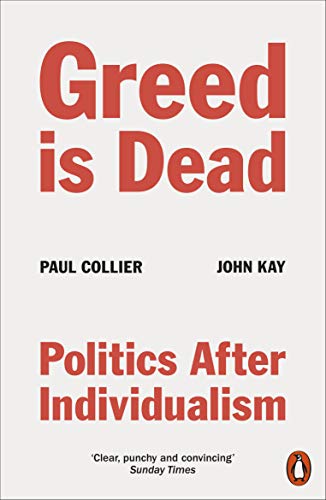Two of the UK's leading economists call for an end to extreme individualism as the engine of prosperity
'provocative but thought-provoking and nuanced' Telegraph
Throughout history, successful societies have created institutions which channel both competition and co-operation to achieve complex goals of general benefit. These institutions make the difference between societies that thrive and those paralyzed by discord, the difference between prosperous and poor economies. Such societies are pluralist but their pluralism is disciplined.
Successful societies are also rare and fragile. We could not have built modernity without the exceptional competitive and co-operative instincts of humans, but in recent decades the balance between these instincts has become dangerously skewed: mutuality has been undermined by an extreme individualism which has weakened co-operation and polarized our politics.
Collier and Kay show how a reaffirmation of the values of mutuality could refresh and restore politics, business and the environments in which people live. Politics could reverse the moves to extremism and tribalism; businesses could replace the greed that has degraded corporate culture; the communities and decaying places that are home to many could overcome despondency and again be prosperous and purposeful. As the world emerges from an unprecedented crisis we have the chance to examine society afresh and build a politics beyond individualism.
چکیده فارسی
دو تن از اقتصاددانان برجسته بریتانیا خواستار پایان دادن به فردگرایی افراطی به عنوان موتور شکوفایی هستند
«تحریک آمیز اما تفکر برانگیز و ظریف» تلگراف
در طول تاریخ، جوامع موفق نهادهایی ایجاد کرده اند که هم رقابت و هم همکاری را برای دستیابی به اهداف پیچیده منافع عمومی هدایت می کنند. این نهادها بین جوامعی که شکوفا می شوند و جوامعی که به دلیل اختلاف فلج شده اند تفاوت ایجاد می کنند، تفاوت بین اقتصادهای مرفه و فقیر. چنین جوامعی کثرت گرا هستند اما کثرت گرایی آنها منضبط است.
جوامع موفق نیز نادر و شکننده هستند. ما نمیتوانستیم مدرنیته را بدون غرایز رقابتی و همکاری استثنایی انسانها بسازیم، اما در دهههای اخیر تعادل بین این غرایز به طرز خطرناکی منحرف شده است: متقابل توسط یک فردگرایی افراطی تضعیف شده است که همکاری را تضعیف کرده و سیاست ما را قطبی کرده است. .
کولیر و کی نشان میدهند که چگونه تأیید مجدد ارزشهای متقابل میتواند سیاست، تجارت و محیطهایی را که مردم در آن زندگی میکنند، تازه و احیا کند. سیاست می تواند حرکت به سمت افراط گرایی و قبیله گرایی را معکوس کند. کسبوکارها میتوانند جایگزین حرص و طمع شوند که فرهنگ شرکتی را تخریب کرده است. جوامع و مکانهای رو به زوال که خانه بسیاری هستند میتوانند بر ناامیدی غلبه کنند و دوباره موفق و هدفمند شوند. همانطور که جهان از یک بحران بی سابقه بیرون می آید، ما این شانس را داریم که جامعه را از نو بررسی کنیم و سیاستی فراتر از فردگرایی بسازیم.
ادامه ...
بستن ...
- ISBN-10 : 0241467950
- ISBN-13 : 978-0241467954
ادامه ...
بستن ...










